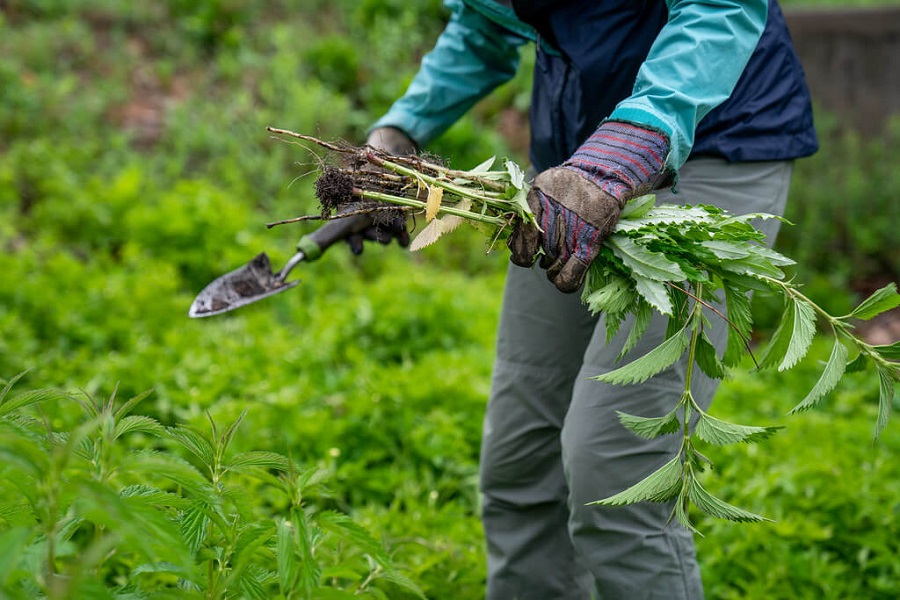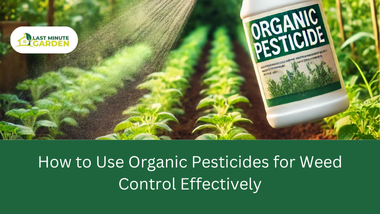Weeds can be a gardener’s worst nightmare, choking out your valuable plants and ruining the aesthetic of your outdoor space.
Weeds seem to be the only plants that thrive without our help, spreading relentlessly through gardens and fields, and competing with valuable crops. Fortunately, organic pesticides for weed control offer a safe and effective solution to keep your garden flourishing without the harmful side effects of synthetic chemicals.
Let’s walk through the best practices and tools you’ll need to control weeds using organic pesticides.
Why Organic Pesticides for Weed Control

Organic pesticides are derived from natural sources and are designed to target unwanted plants while being less harmful to beneficial insects and the environment.
Synthetic weed killers may work fast, but they often harm beneficial plants, pollute the soil, and risk contaminating water sources. However, Organic pesticides leverage natural compounds derived from plants, minerals, and even animals to target weeds specifically.
This l approach helps eliminate unwanted plants and also keeps your garden safe for pollinators, pets, and the entire ecosystem.
Steps to Control Weeds Using Organic Pesticides

Step 1: Identify Your Weeds
Before applying any organic pesticide, it’s essential to identify the types of weeds you’re dealing with. Different weeds may require different treatment methods. Common types include:
- Annual Weeds: These weeds complete their life cycle in one year and can be controlled with timely applications.
- Perennial Weeds: These weeds return year after year and often require more persistent control measures.
- Invasive Species: Some weeds can spread rapidly and may need targeted approaches to eradicate.
Understanding the specific characteristics of your weeds will help you choose the most effective organic pesticide for weed control.
Step 2: Choose the Right Organic Pesticide
There are several types of organic pesticides available for weed control. Here are some popular options:
- Vinegar: A household staple, vinegar can effectively kill many annual weeds due to its high acidity.
- Boiling Water: Pouring boiling water directly onto weeds can scald them, making it an effective method for small patches.
- Corn Gluten Meal: This natural herbicide prevents weed seeds from germinating when applied before they sprout.
- Salt Solutions: Salt can be used as a desiccant to dry out unwanted plants, but caution is advised as it can also harm surrounding soil and plants.
- Fatty Acid: Fatty acids disrupt the cell membranes, effectively stopping weed growth.
Be mindful to select an organic pesticide that suits your specific needs and aligns with the type of weeds you’re targeting.
Step 3: Prepare Your Garden
Before applying any organic pesticide, prepare your garden by clearing away debris and other plants that might interfere with the treatment. This step ensures that the pesticide reaches the weeds directly without competition from other vegetation.
Make sure to read the instructions on your chosen product carefully. Some organic pesticides may require dilution or specific application methods.
Keep in mind that organic pesticides work best on young weeds or newly sprouted growth, so catching them early can help prevent the need for multiple applications.
Step 4: Apply the Organic Pesticide Carefully
Using a sprayer or garden sprayer, apply the pesticide directly onto the leaves of the weeds. Avoid overspray, as organic pesticides can harm nearby plants. Be strategic: target the base and leaves of each weed, ensuring they receive an even coat.
Early morning or late afternoon is often the best time to apply treatments when temperatures are cooler, reducing evaporation and increasing effectiveness. Follow these tips during application:
- Target Weeds Directly: Aim for the foliage of the weeds rather than spraying indiscriminately across your garden.
- Use Protective Gear: Even though organic pesticides are safer than synthetic options, wearing gloves and protective eyewear is still a good practice.
- Avoid Windy Days: Wind can carry sprays away from their intended target, making the application less effective.
Step 5: Monitor and Maintain

After applying your organic pesticide, monitor your garden regularly. Check for signs of weed resurgence and assess the effectiveness of your treatment. You may need to reapply or try different methods if certain weeds persist.
In addition to using organic pesticides for weed control, consider integrating other practices into your gardening routine:
- Mulching: Applying a layer of mulch around your plants can suppress weed growth by blocking sunlight.
- Hand Pulling: Regularly pulling weeds by hand is an effective way to manage small infestations before they spread.
- Crop Rotation: Changing where you plant certain crops each season can disrupt weed growth patterns.
Using organic pesticides for weed control in conjunction with good lawn care practices like aeration and proper watering can improve overall effectiveness and reduce weed populations.
Takeaway: How To Make Organic Pesticides for Weed Control
To create an effective organic pesticide for weed control, you can easily use common household ingredients. Here’s a straightforward recipe that combines natural elements to help eliminate unwanted weeds in your garden.
Common ingredients you can use include vinegar, lemon juice, dish soap, and water.
In a clean spray bottle, combine 1 gallon of vinegar, 1 cup of lemon juice, 2 tablespoons of dish soap, and fill the rest of the bottle with water, mix well to ensure all ingredients are combined.
Spray directly onto the leaves of the weeds you want to eliminate. Be cautious to avoid spraying desirable plants, as this solution can harm them too.
After application, monitor the treated area. You should see results within a few hours, with weeds wilting and turning brown within 24 hours.
Safety Tips
- Always test a small area first to ensure that your mixture does not harm surrounding plants.
- Wear gloves and eye protection while handling these ingredients to prevent irritation.
- Store any leftover solution in a cool, dark place and shake well before each use.
Final Thought
Using organic pesticides for weed control effectively requires careful planning and execution. By identifying your weeds, choosing the right products, preparing your garden, applying treatments correctly, and maintaining vigilance, you can keep your outdoor space thriving without resorting to harmful chemicals.
Embrace these strategies to cultivate a healthy garden that flourishes naturally!




